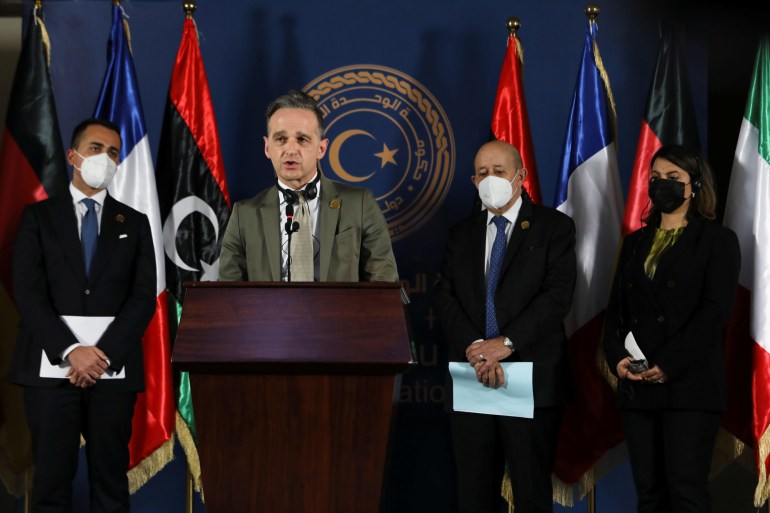The Libyan Foreign Minister in the national unity government called today, Thursday, for an "immediate" withdrawal of all mercenaries from the country, while the foreign ministers of Italy, Germany and France from Tripoli announced their support for the new government.
Minister Najla Al-Manqoush said during a press conference with her French, German and Italian counterparts in Tripoli, "We affirm the immediate exit of all mercenaries from our country."
Al-Manqoush stressed the importance of speeding up the resumption of the activities of embassies and consulates in Libya, as well as activating and rebuilding confidence in economic mobility.
For his part, Italian Foreign Minister Luigi Di Maio confirmed the European Union's support for the path of stability in Libya, and stressed that there is no military solution to the Libyan crisis.
And he indicated that he and his counterparts stressed the need for a ceasefire, the opening of the road between Sirte and Misurata, and the exit of all mercenaries and foreign forces from the Libyan soil, expressing his appreciation for what he described as patriotism and the determination of the members of the (5 + 5) committee to support this path.
He indicated that Europe will continue its commitment to implementing the ceasefire, and it must redouble efforts in training land and sea border guards.
Al-Manqoush stressed the importance of speeding up the return of the activities of embassies and consulates in Libya (Reuters)
Support and importance
As for the French Foreign Minister, Jean-Yves Le Drian, he confirmed his country and the European Union's support for the national unity government in Libya.
He said that Libya is an important neighbor to Europe, and that its stability is the key to the stability of the Sahel, North Africa and the Mediterranean.
He indicated that during the talks with the Libyans, a message in support of the unity government was sent for a democratic transition, in order to complete the December 24 elections on time.
He also affirmed the readiness of Paris, Rome and Berlin to provide all support to the organization of these elections.
Maas confirmed Berlin's support for the national unity government in Libya (Reuters)
He reiterated the need to implement a ceasefire on the ground, and to open the coastal road, which gives priority to the withdrawal of all foreign forces and mercenaries from Libya in order to restore its unity and sovereignty.
For his part, German Foreign Minister Heiko Maas confirmed Berlin's support for the national unity government in Libya, and praised what he described as the political achievement that has been achieved in this country.
"Today we are reaping the fruits of the Berlin path, and it is thanks to the Libyans to achieve this success, leading to the preparation for the December elections. All this is the result of a great diplomatic effort and coordination between the Libyans and the international parties," he said.
Prime Minister Dabaiba (center) during his meeting with European ministers (Reuters)
Meet in Cairo
Meanwhile, the head of the Libyan Presidency Council, Muhammad al-Manfi and his deputy, Abdullah al-Lafi, met Egyptian President Abdel Fattah al-Sisi and senior Egyptian officials, in their first visit to an Arab country since assuming their duties early this month.
The head of the national unity government, Abdel Hamid Dabaiba, met with the Egyptian president last month in Cairo, after he was chosen to take over from the Libyan Political Forum held in Geneva.
On the fifth of last February, the Forum for Political Dialogue - under the auspices of the United Nations - elected a unified executive authority, which includes a government headed by Abd al-Hamid al-Dabaiba, and a presidential council headed by Muhammad al-Manfi.
To lead the country to the parliamentary and presidential elections scheduled for December 24th.
Libyans hope that the new government will end the years of armed conflict (Anatolia)
Ending the conflict
Libyans hope that the unified authority will contribute to ending years of armed conflict, as a result of the struggle of the forces of retired Major General Khalifa Haftar, the internationally recognized government, over legitimacy and authority in the oil-rich country.
The new executive authority is responsible for unifying state institutions and overseeing the transitional phase until the December 24 elections, when their term expires under the latest road map.
In addition to this, the most prominent challenge represented by the removal of all foreign forces and mercenaries numbering about 20 thousand deployed in most areas of Libya.
The Secretary-General of the United Nations, António Guterres, in a report submitted to the Security Council yesterday, Wednesday, expressed his "deep concern" about "reports about the continued presence of foreign elements in Sirte and its surroundings and central Libya."

